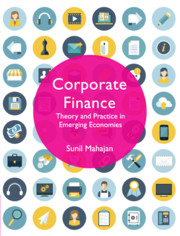Book contents
- Frontmatter
- Contents
- List of Figures
- List of Tables
- List of Corporate Snippets
- List of Abbreviations
- Preface
- Acknowledgements
- 1 Corporate Finance: A Conceptual Introduction
- 2 Financial Markets
- 3 The Time Value of Money
- 4 Capital Budgeting
- 5 Risk and Return
- 6 Valuation
- 7 Capital Structure and Financing
- 8 Dividend Payout: Policy and Practices
- 9 Leverage
- 10 Financial Derivatives
- 11 International Finance
- 12 Working Capital
- 13 Ratio Analysis
- Appendix
- Bibliography
- Index
Preface
Published online by Cambridge University Press: 30 April 2020
- Frontmatter
- Contents
- List of Figures
- List of Tables
- List of Corporate Snippets
- List of Abbreviations
- Preface
- Acknowledgements
- 1 Corporate Finance: A Conceptual Introduction
- 2 Financial Markets
- 3 The Time Value of Money
- 4 Capital Budgeting
- 5 Risk and Return
- 6 Valuation
- 7 Capital Structure and Financing
- 8 Dividend Payout: Policy and Practices
- 9 Leverage
- 10 Financial Derivatives
- 11 International Finance
- 12 Working Capital
- 13 Ratio Analysis
- Appendix
- Bibliography
- Index
Summary
I have been teaching for over two decades. During this period, I have witnessed a quantum jump in the number of students pursuing business management in India and a significant decline in standards. Maybe, there is a correlation between the two. Business management as a course and the corporate sector as a career choice are demanding. Not everyone has the competence, or the inclination, to pursue it successfully. In our desire to be inclusive and to pass on the benefit of business management as a career to everyone, we may have diluted the standards significantly.
Management education in India presents a contrast. The top few business schools are demanding in terms of who they accept and the inputs they provide during the two years of the course. Only the best and the toughest emerge unscathed, ready to take on the challenges the corporate sector throws at them. They compete with the best global business schools on equal terms and the students have, over time, proven their competence in the corporate world throughout the world.
At the bottom are a large number of schools lacking in funding, competent faculty, infrastructure and, of course, students who can stand up to the rigour demanded by the study and practice of management. Of course, the desire to establish standards may also be lacking. The consequent dilution in quality has created a wide chasm, which has destroyed the credibility of management education in the country. MBA is not an inclusive course; by trying to make it inclusive, we have diluted its core and it no longer commands the respect it earlier did.
At the same time, management education in the country cannot be restricted to the top few. Not only would that be an elitist approach, it would ensure that the country is unable to provide for and meet the rising demand for professionals for a fast-expanding corporate sector.
This demand is currently fulfilled by business schools in the mid-range that may not match the best in the country but are able to provide inputs to students that enable them to pursue a lucrative career.
- Type
- Chapter
- Information
- Corporate FinanceTheory and Practice in Emerging Economies, pp. xxiii - xxivPublisher: Cambridge University PressPrint publication year: 2020



